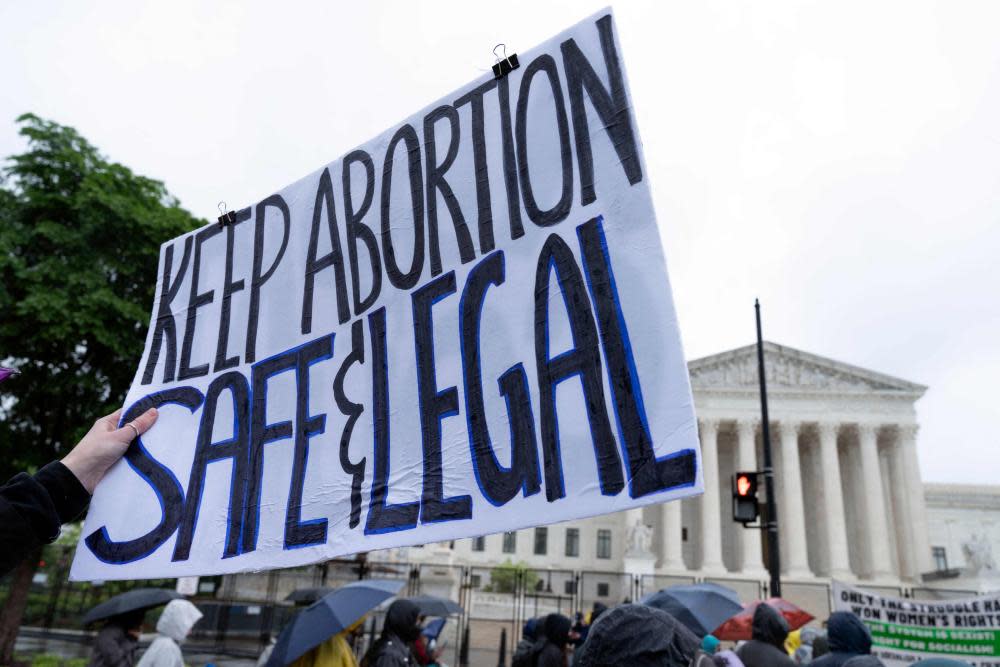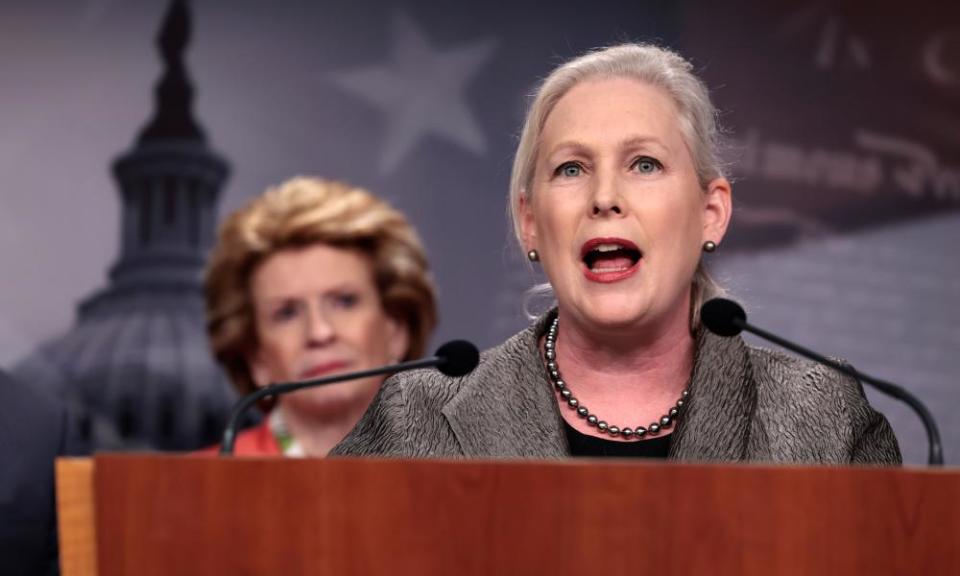Gillibrand calls abortion rights ‘fight of generation’ after ‘bone-chilling’ court draft opinion

- Oops!Something went wrong.Please try again later.
- Oops!Something went wrong.Please try again later.
Senator Kirsten Gillibrand on Sunday called the battle over abortion rights in the US the “biggest fight of a generation”.
The New York Democrat urged her party to stand up to Republicans seeking to abolish the constitutional right, and called the draft US supreme court opinion leaked last week, revealing a conservative-leaning super-majority supports overturning the landmark 1973 Roe v Wade decision, “bone-chilling”.
She told CNN’s State of the Union Sunday politics talkshow: “This is the biggest fight of a generation … and if America’s women and the men who love them do not fight right now, we will lose the basic right to make decisions, to have bodily autonomy and to decide what our futures look like.”
Mississippi’s Republican governor, Tate Reeves, praised the draft ruling, which emerged last Monday evening and immediately sparked protests outside the supreme court in Washington DC, with more the next day and huge demonstrations planned across the US.
His state has the pivotal case currently before the court that includes the option not just to severely restrict the procedure further but specifically to overturn the Roe v Wade opinion that made abortion a federal right, which was reaffirmed by the supreme court in 1992.
“While this is a great victory for the pro-life movement, it is not the end. In fact, it’s just the beginning,” Reeves said of the draft opinion. Mississippi hopes to ban almost all abortion in a state that normally carries out around 3,500 such procedures a year.
He talked of providing more education for women, to help them get better jobs to support children.
Gillibrand called Reeves “paternalistic” and his and the court’s stance outrageous.

“It’s taking away women’s right for life, liberty and the pursuit of happiness, our right to be a full citizen,” she said, adding that women are “half-citizens under this ruling and if this is put into law, it changes the foundation of America”.
Reeves said Mississippi plans to improve adoption processes and foster care systems and provide more resources for those expecting. However the state has a poor record on healthcare for low-income women, particularly women of color, in a nation frequently called out for high infant mortality rates and poor antenatal health.
CNN host Jake Tapper noted that Mississippi has the highest rate of child mortality in the US, the highest rate of child poverty, no guaranteed paid maternity leave and that the legislature in Mississippi “just rejected extending postpartum Medicaid coverage”, referring to government health insurance for low-income populations. Tapper also pointed out that Mississippi’s foster care system is the subject of a long-running federal lawsuit over its failure to protect children from abuse.
Reeves said: “I was elected not to try to hide our problems but to try to fix our problems.”
Jake Tapper to Mississippi Gov. Tate Reeves: You say you want to do more to support mothers and children, but you’ve been in state government since 2004... Based on the track record of the state of Mississippi, why should any of these girls or moms believe you?" pic.twitter.com/VLuA6gcS1F
— Justin Baragona (@justinbaragona) May 8, 2022
Gillibrand said she was offended by Reeves’s remarks, adding: “I thought he was quite paternalistic towards women. He doesn’t look at women as full citizens.”
The Senate majority leader, Chuck Schumer, a fellow New York Democrat, said on Sunday that a piece of legislation that has been stalled in Congress would be put to the vote by the Senate again, on Wednesday.
The Women’s Health Protection Act, which enshrines the rights afforded by Roe into federal legislation, rather than relying on court decisions, has passed the House of Representatives but was struck down in the Senate in March, with one Democrat joining Republicans in opposing it.
Related: Abortion deserts: America’s new geography of access to care – mapped
The final supreme court decision on Roe is due in June.
Overturning Roe and instead letting each state set its own law on abortion would leave entire regions of the country without an abortion clinic within a day’s drive, reshaping the geography of abortion access in America in a single seismic shift.
Minnesota Democratic senator Amy Klobuchar told ABC’s This Week host Martha Raddatz that there were Democrats in Congress and Democratic candidates who do not support abortion rights.
But she said: “You have people who are personally pro-life but believe that that decision should be a woman’s personal choice, even if they might not agree with them. We have people in our party who vote to uphold Roe v Wade who might have different personal opinions, that’s a really important distinction.”
“In the wake of the leaked draft, activists on both sides of the debate immediately began mobilizing for a drastic shift in America’s abortion laws.” @MarthaRaddatz sits down with the leaders of two advocacy groups: https://t.co/ECy1oebCRT pic.twitter.com/fU8IVPgdlf
— This Week (@ThisWeekABC) May 8, 2022
She accused the supreme court, which achieved a right-leaning controlling majority after Donald Trump nominated three justices – now having six conservatives and only three liberal-leaning judges on the nine-member bench, of wanting to take America back into ancient history.
The draft opinion was written by conservative justice Samuel Alito.
“The court is looking at reversing 50 years of women’s rights, and the fall will be swift. Over 20 states have laws [to ban] in place already. Who should make this decision, should it be a woman and her doctor, or a politician? Should it be [conservative Republican Senator] Ted Cruz … or a woman and her family? Justice Alito is literally not just taking us back to the 1950s, he’s taking us back to the 1850s,” Klobuchar said.
Pro-abortion rights groups Naral Pro-Choice America, Planned Parenthood and Emily’s List plan between the three of them to put more than $150m into campaigns to support abortion rights advocates as political candidates in elections this year.
Mini Timmaraju, president of NARAL, told ABC: “As a movement, this has been probably the most devastating year since pre-1973.”

